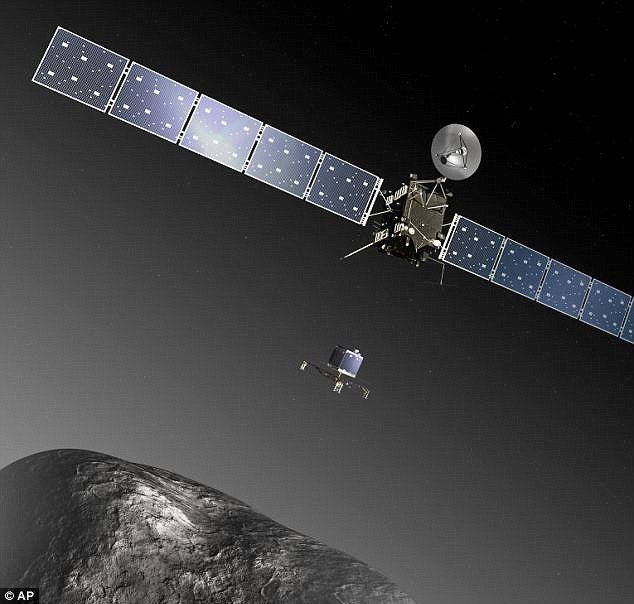
European Space Agency’s Rosetta satellite will release the Philae lander on a seven-hour descent to the surface of Comet 67P/Churyumov-Gerasimenko on November 12 at 08:35 GMT.
The flight team, based in Darmstadt, Germany, has confirmed that Rosetta is lined up correctly.
If Philae gets down successfully, it will be the first time that a robot has landed on the surface of a comet.
Confirmation is expected at Earth around 16:00 GMT.
If all goes to plan, the little robot, called Philae, will deploy screws and harpoons to secure its position on the comet after a seven-hour flight.
The first thing Philae will do on landing is send back a picture of its surroundings – a strange landscape containing deep pits and tall ice spires.
This is, though, an event with a highly uncertain outcome.
Early on November 12, the third “go” signal was delayed due to concerns over the health of the Philae lander.
“We almost didn’t get the third <<go>>,” said Paolo Ferri, head of operations at ESA.
The thruster system used to push the robot into the surface of the comet when it touches down could not be primed. This means Philae will now have nothing to push it into the surface of the comet.

“We will just have to rely now on the harpoons, the screws in the feet, or the softness of the surface. It doesn’t make it any easier, that’s for sure,” said lander chief Stephan Ulamec, from the German Space Agency. But the landing attempt goes ahead.
The terrain that has been chosen for the landing on the rubber-duck-shaped object is far from flat.
Philae could bash into cliffs, topple down a steep slope, or even disappear into a fissure.
ESA’s Rosetta mission manager Fred Jansen said that despite these challenges, he was very hopeful of a positive outcome.
“We’ve analyzed the comet, we’ve analyzed the terrain, and we’re confident that the risks we have are still in the area of the 75% success ratio that we always felt,” he told reporters here at ESA’s mission control in Darmstadt, Germany.
The prize that awaits a successful landing is immense – the opportunity to sample directly a cosmic wonder.
Comets almost certainly hold vital clues about the original materials that went into building the Solar System more than 4.5 billion years ago.
Mission control will closely monitor the mothership and lander as they move towards separation.
The vast distance between the comet and the Earth – 510 million km – means radio commands take almost half-an-hour to reach the spacecraft.
Nonetheless, the flight team must put Rosetta on a very precise path, to make sure Philae has the best opportunity of arriving squarely in the chosen landing zone.
These navigation instructions were due to be sent up late on Tuesday.
Once the 100kg robot is let go at 08:35, it has no means of adjusting its descent; Philae will go where the comet’s gravity pulls it.
Controllers in Darmstadt will want to hear not only that Philae landed in one piece but that it is securely fastened to the comet.
The nature and strength of the surface materials are unknown, however.
Philae could alight upon terrain whose constitution is anything between rock hard and puff-powder soft.
If it can, the robot will endeavor to lock itself in place with screws in its feet and harpoons that fire from its underside.
ESA has cautioned that success may require a large slice of luck in addition to the skill of all the teams involved.
Rosetta was dispatched from Earth to catch 67P in 2004. That means it and Philae were designed and built in the 1990s.
[youtube MgQKJ0mBtrQ 650]
[youtube 1aBWi9aPggo 650]